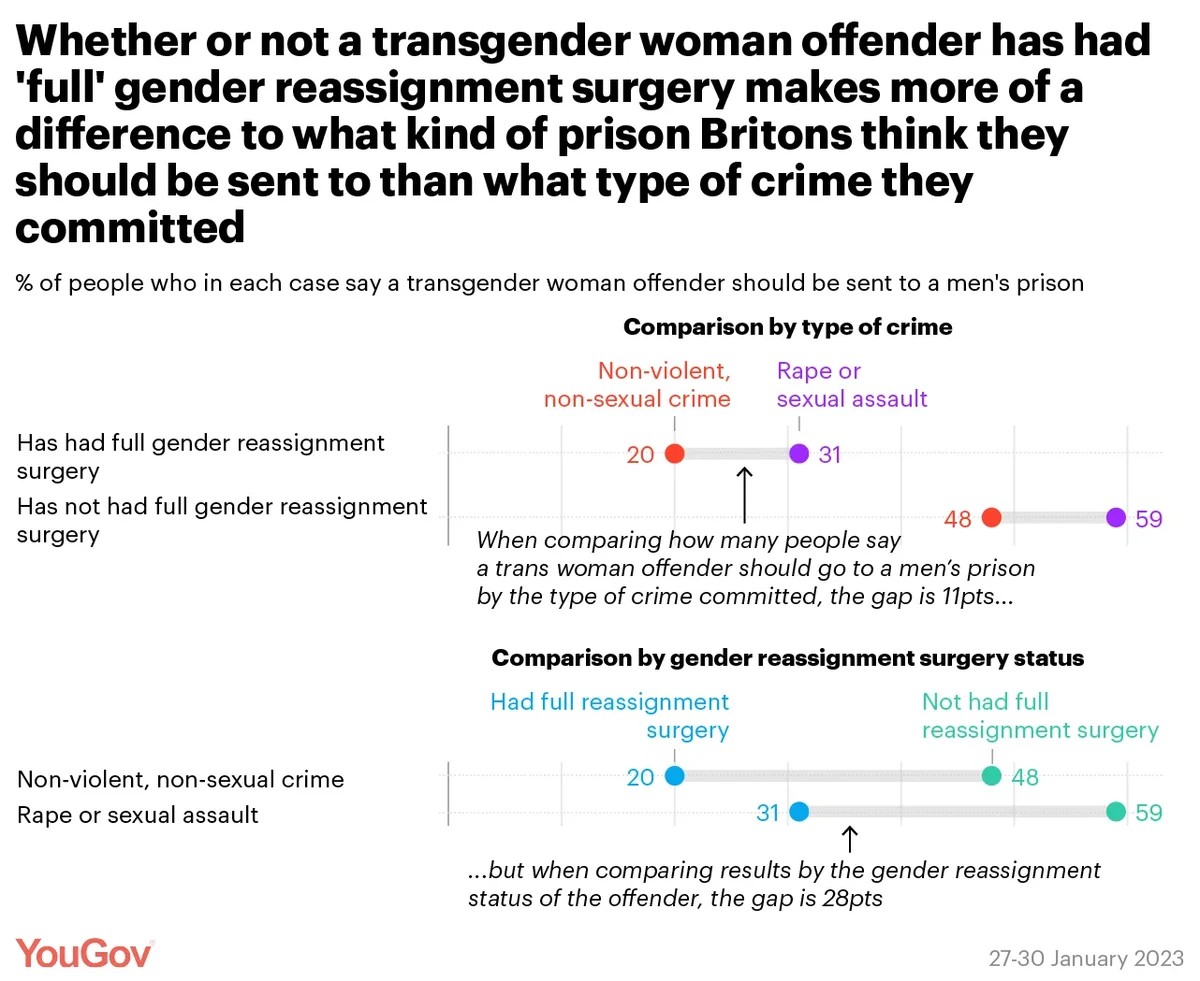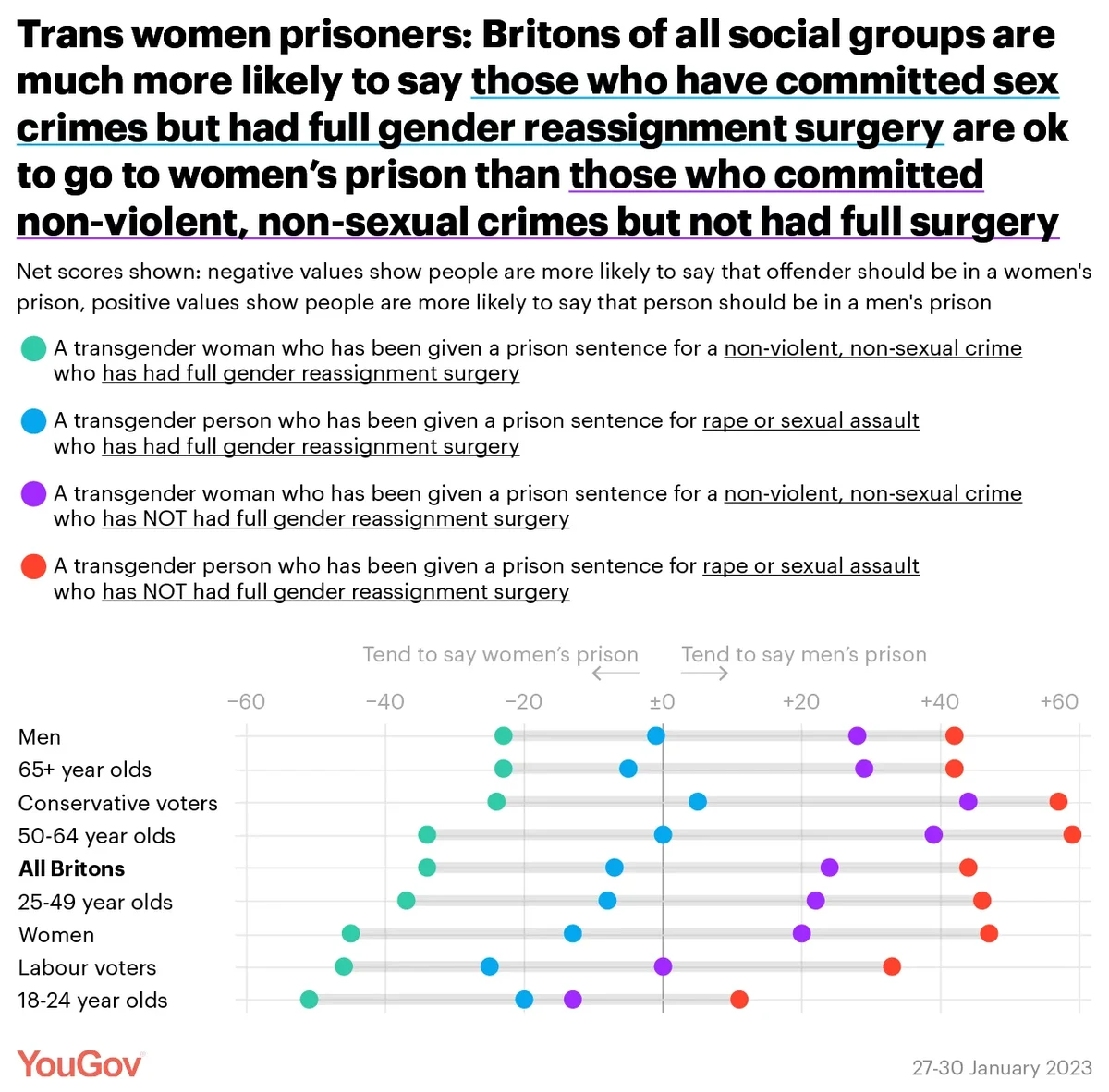It makes more of a difference to Britons’ views whether or not a prisoner has had ‘full’ gender reassignment surgery than what kind of crime they committed
Following the furore over Isla Bryson, a transgender woman in Scotland who was remanded to a woman’s prison after being convicted of rape prior to her gender transition, the Scottish government has announced a “pause” on transgender prisoners with a history of violence against women being placed in female jails in Scotland.
In cases like Bryson’s – that of a transgender woman who has not undergone ‘full’ gender reassignment surgery*, and who has been convicted of rape or sexual assault – a majority of Britons (59%) say the offender should serve their time in a men’s prison. Only 15% think they should go to a women’s prison, with 27% unsure.
Women and men’s views are largely identical: 57% of men and 61% of women say this type of offender should go to a men’s prison, with only 14-15% saying they should go to a women’s prison.
In all age groups people tend to say this kind of trans woman offender should go to a men’s prison. While a majority of those over the age of 25 feel this way, 18-24 year olds are more divided, with 36% saying a men’s prison but 25% saying a women’s prison. A significantly larger number of young people answered “don’t know” to this question (39%) than other age groups (22-28%).
Both Conservative voters (70%) and Labour voters (50%) say trans women offenders who have not had full reassignment surgery and who are convicted of rape or sexual assault should go to men’s prison, with just 13-17% of each group saying women’s prison.
Finally, those in Scotland, the setting for the recent trans prisoner debate, believe that offenders like Isla Bryson should go to a men’s prison at the same rate (59%) as the wider UK.
Whether or not a transgender woman offender has had ‘full’ reassignment surgery has a greater impact on Britons’ views than whether or not they committed sex crimes
The survey also asked variations of the same question that examine how attitudes differ depending on the crime committed and whether or not the offender has had ‘full’ gender reassignment surgery.
For transgender women prisoners who commit rapes or sexual assaults, the number of people who say they should be in men’s prison falls to 31% if they have had full reassignment surgery, with the number of people saying they should be in women’s prison rises to 38%.
When it comes to trans women offenders who have committed non-violent, non-sexual crimes, 48% of Britons say they should be in a men’s prison if they have not had full gender reassignment surgery, compared to 20% who say they should be in a men’s prison if they have had full surgery.

When commenting on the events surrounding the Bryson case, Nicola Sturgeon said: “From my point of view, it's not so important what gender they are, it's the crimes that they have committed.”
But the results indicate that the crime involved is a less important factor to Britons in deciding where to house a trans woman offender than whether or not they have had gender reassignment surgery, rather than whether they committed a sex crime or not.
When comparing the results by whether or not the offender has had full reassignment surgery, the proportion of people saying a trans woman offender who has not had full surgery should go to men’s prison is 28pts higher than the number saying an offender who has had full surgery should do so. By contrast, when comparing the results by whether or not the offender has committed rape or sexual assault, the gap is only 11pts.
Men, older Britons, and Conservative voters are more likely to say trans women offenders should go to men’s prison
While men’s and women’s views are very similar when it comes to a trans woman convicted of sex crimes who has not had full gender reassignment surgery, in each of the three other scenarios we asked about, women are somewhat less likely than men to think the offender should be sent to a men’s prison.
In the case of a trans woman convicted of sex crimes who has undergone full reassignment surgery, this puts women generally in favour of that convict going to women’s prison (by 41% to 28% who say a men’s prison) while men are divided 35% to 34%.
Generally speaking, men, older Britons, and Conservative voters are less likely than their female, younger and Labour counterparts to think that trans women prisoners should go to women’s prisons. This division mirrors views on wider transgender issues.
Aside from the consensus that prisoners like Isla Bryson (red in the chart below) should go to men’s prisons, most groups also agree that trans women offenders who have not had full gender reassignment surgery and who have committed non-violent, non-sexual crimes (purple in the chart) should go to men’s prisons – with Labour voters split and younger Britons taking the opposing view.

Likewise, while most groups tend to think trans women offenders who have had full gender reassignment surgery that are convicted of rape or sexual assault (blue in the chart) should be in a women’s prison, men and 50-64 year olds are split, and Tory voters overall tend slightly towards saying they should be in a men’s prison.
This means that every social group is more likely to say that a trans woman who committed sex crimes but has had full gender reassignment surgery should be in a women’s prison than a trans woman who committed non-violent, non-sexual crimes but has not had full gender reassignment surgery.
All groups tend to believe that transgender women offenders who have had full gender reassignment surgery and committed non-violent, non-sexual offences (green in the chart) should be in women’s prisons.
*Gender reassignment surgery was described as follows to respondents: “Some transgender people have gender reassignment surgery. This is surgery by which a transgender person's physical attributes are altered to match the gender they identify with (e.g. breast and genital surgery).”
Photo: Getty











